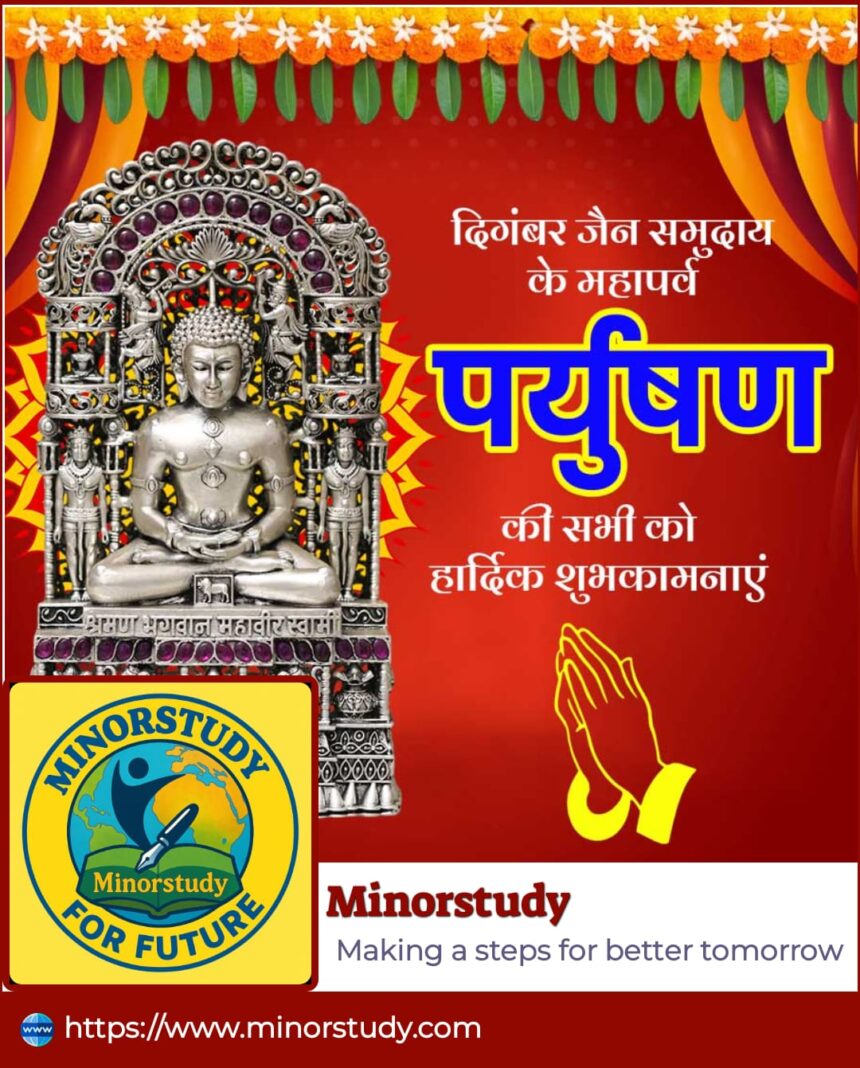🌟 Introduction
Festivals are not just about celebration; they are also about self-reflection, spiritual growth, and inner peace. In Jainism, one of the most important and sacred festivals is Paryushan, also known as Paryushan Parva.
- 🌟 Introduction
- 🌿 What is Paryushan?
- 🏛️ History of Paryushan
- 📜 Timeline of Paryushan
- ✅ Significance of Paryushan
- 🪔 Observance of Paryushan
- 🔹 For Shwetambar Jains (8 Days)
- 🔹 For Digambar Jains (10 Days – Dash Lakshana Parva)
- 🔹 Common Practices
- 🌍 Daily Life Impacts of Paryushan
- 📊 Interesting Facts About Paryushan
- 💌 Wishing Messages for Paryushan
- 📌 Important Points
- ❓ FAQs
- 🏆 Importance of Paryushan in Society
- 📝 Conclusion
Unlike most festivals that are celebrated with external rituals, Paryushan emphasizes self-discipline, forgiveness, and purification of the soul. It is a time for Jains to pause from daily routines, reflect on their actions, seek forgiveness, and walk closer toward liberation (moksha).
This article will explore everything about Paryushan—its history, timeline, significance, observance, facts, wishing, daily life impacts, FAQs, and importance to society.
🌿 What is Paryushan?
The word Paryushan comes from the Sanskrit root words:
Pari = All around.
Ushan = To stay, to come closer.
Thus, Paryushan means “coming together and staying closer to the soul.”
It is an 8-day festival for Shwetambar Jains and a 10-day festival (Dash Lakshana Parva) for Digambar Jains. Both traditions celebrate it as a time of introspection, penance, fasting, and forgiveness.
🏛️ History of Paryushan
Origins in Jain Teachings
Paryushan is deeply rooted in the teachings of the 24 Tirthankaras, especially Lord Mahavira, who emphasized ahimsa (non-violence), aparigraha (non-attachment), and kshama (forgiveness).
It evolved as a time for monks and laypeople to unite in spiritual practice.
Seasonal Significance
The festival is observed in the Chaturmas (monsoon months) when Jain monks and nuns traditionally halt their travels and stay in one place.
This provided an opportunity for the community to come together for learning and self-purification.
Scriptural Mentions
Jain Agamas (scriptures) prescribe Paryushan as the most important time for self-discipline.
📜 Timeline of Paryushan
6th Century BCE: Teachings of Lord Mahavira lay the foundation of forgiveness rituals.
Ancient Era: Monks begin observing spiritual retreats during monsoon → evolution of Paryushan.
Medieval Period: Community-wide observance strengthens; fasting and collective prayers become common.
Modern Times: Celebrated globally among Jain diaspora; forgiveness rituals (Kshamavani) spread awareness of non-violence and peace.
✅ Significance of Paryushan
Spiritual Purification: Cleanses karmic impurities through fasting, prayer, and penance.
Forgiveness: The heart of Paryushan—seeking and granting forgiveness (Michhami Dukkadam).
Discipline: Encourages self-control and detachment from material desires.
Non-Violence: Strengthens commitment to ahimsa in thought, word, and deed.
Unity: Brings families and communities closer in shared rituals.
Peace: Promotes harmony within oneself and with others.
Global Message: Teaches universal values of tolerance, love, and compassion.
🪔 Observance of Paryushan
🔹 For Shwetambar Jains (8 Days)
Begins on Bhadrapada Shukla Chaturthi and ends on Samvatsari (the day of forgiveness).
Practices include:
Pratikraman (introspection)
Fasting (Upvas, Ekasana, Ayambil)
Listening to Kalpa Sutra (scripture reading).
🔹 For Digambar Jains (10 Days – Dash Lakshana Parva)
Begins on Bhadrapada Shukla Panchami and lasts 10 days.
Focuses on the Ten Virtues (Dashalakshana Dharma) like forgiveness, humility, truth, and non-attachment.
🔹 Common Practices
Fasting: Ranges from eating once a day to total fasting.
Prayers & Penance: Meditation, chanting, and scripture reading.
Kshamavani Day: On the last day, Jains ask for forgiveness from all beings by saying:
“Michhami Dukkadam” (If I have hurt you knowingly or unknowingly, forgive me).
🌍 Daily Life Impacts of Paryushan
Emotional Healing: Forgiveness helps release anger and grudges.
Better Relationships: Saying Michhami Dukkadam restores harmony among families and friends.
Healthy Living: Fasting improves self-discipline and detoxifies the body.
Mental Peace: Meditation reduces stress and anxiety.
Spiritual Growth: Encourages mindfulness and humility.
Social Harmony: Strengthens bonds in society through shared rituals of forgiveness.
📊 Interesting Facts About Paryushan
Paryushan is the most important Jain festival, considered greater than Diwali for Jains.
The last day, Samvatsari, is the “Day of Universal Forgiveness.”
Many Jains observe complete fasting for all 8 or 10 days.
Michhami Dukkadam is exchanged millions of times during this period.
Jain monks and nuns deliver special discourses during Paryushan, often focusing on ethical living and compassion.
Paryushan inspires non-Jains as well, with many adopting forgiveness and fasting during this period.
💌 Wishing Messages for Paryushan
🌸 “Wishing you peace, forgiveness, and inner strength this Paryushan. Michhami Dukkadam.”
🌟 “May Paryushan bring light, compassion, and happiness into your life.”
🙏 “On this holy occasion of Paryushan, let us forgive and seek forgiveness. Micchhami Dukkadam.”
🌿 “Happy Paryushan! May your soul be cleansed with peace and purity.”
📌 Important Points
Paryushan = “Staying closer to the soul.”
Duration: 8 days (Shwetambar) or 10 days (Digambar).
Central Ritual: Forgiveness (Michhami Dukkadam).
Focus: Self-purification, fasting, discipline, and forgiveness.
Global Relevance: Universal message of peace and tolerance.
❓ FAQs
Q1. What is the main purpose of Paryushan?
To cleanse the soul, practice discipline, and seek forgiveness.
Q2. Why do Jains fast during Paryushan?
Fasting helps in controlling desires, reducing karmic bondage, and focusing on spirituality.
Q3. What is said on the last day of Paryushan?
“Michhami Dukkadam,” meaning “I seek forgiveness for any harm caused knowingly or unknowingly.”
Q4. Is Paryushan celebrated only in India?
No, Jains across the world—USA, UK, Africa, and beyond—celebrate Paryushan.
Q5. How does Paryushan impact daily life?
It teaches forgiveness, self-control, non-violence, and promotes harmony in relationships.
🏆 Importance of Paryushan in Society
Promotes Peace: Reduces conflicts through forgiveness rituals.
Builds Compassion: Encourages kindness and empathy.
Strengthens Families: Helps heal broken relationships.
Encourages Discipline: Reduces materialistic tendencies.
Universal Value: Forgiveness and non-violence are relevant to all religions and communities.
📝 Conclusion
Paryushan is not just a Jain festival—it is a philosophy of life.
In today’s fast-paced world, we often forget to pause, reflect, and forgive. Paryushan reminds us that real strength lies not in holding grudges but in forgiving and seeking forgiveness.
It encourages us to:
Purify our souls through fasting and discipline.
Heal our relationships through forgiveness.
Live with compassion, tolerance, and non-violence.
As we greet each other with “Michhami Dukkadam,” let us truly mean it. Let us carry the spirit of Paryushan beyond 8 or 10 days and make forgiveness a daily practice.
In this way, Paryushan becomes not just a ritual, but a transformative journey of peace, humility, and liberation. 🌿
Michhami Dukkadam 🙏









It’s a pity you don’t have a donate button! I’d without a doubt donate to this excellent blog! I suppose for now i’ll settle for bookmarking and adding your RSS feed to my Google account. I look forward to new updates and will share this blog with my Facebook group. Talk soon!
**mitolyn official**
Mitolyn is a carefully developed, plant-based formula created to help support metabolic efficiency and encourage healthy, lasting weight management.
Thanks for sharing. I read many of your blog posts, cool, your blog is very good. https://www.binance.com/hu/register?ref=IQY5TET4